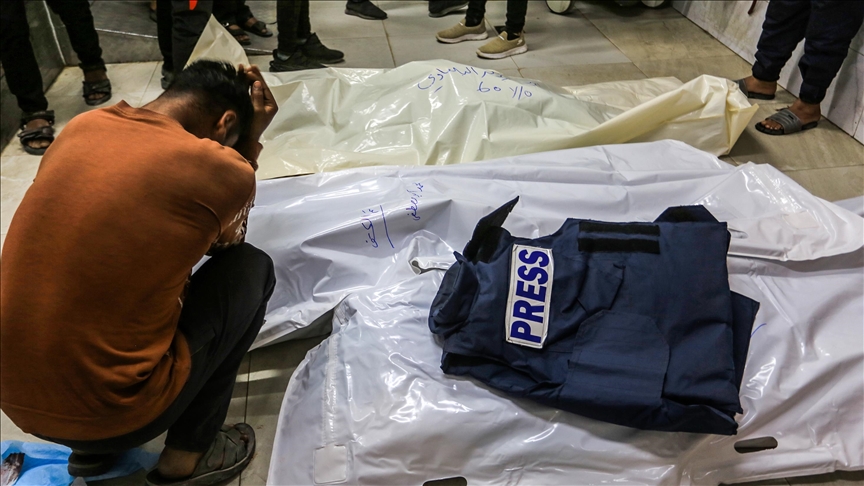Voices of resistance: Women journalists challenge media silence, redefine narrative on Palestine
‘I don’t want us Palestinians to be both killed and silenced �� It’s a duty and a mission to be a journalist, more than a profession,�� says Palestinian journalist and author Plestia Alaqad
 Relatives mourn the loss of Palestinian journalist Ahmed Mansour of the news outlet Palestine Today during the funeral ceremony in Khan Yunis, Gaza, on April 8, 2025.
Relatives mourn the loss of Palestinian journalist Ahmed Mansour of the news outlet Palestine Today during the funeral ceremony in Khan Yunis, Gaza, on April 8, 2025.
- ‘We put on a pedestal influencers, politicians, thought leaders, who were really taking away from the truth … and who are showing no backbone because they’re not speaking up,’ says Egyptian journalist and activist Rahma Zein
ISTANBUL
Israel’s ongoing assault on the Gaza Strip has come to be known as “the world’s first livestreamed genocide,” a chilling description used by many seeking justice for Palestinians – from lawyers at the International Court of Justice to the most prominent of human rights activists and organizations.
For nearly 18 months, visuals of Israel’s relentless strikes and their horrific human costs have been reaching millions, playing a vital role in fueling the public outrage being witnessed in all parts of the globe.
That has only been possible because of the journalists in Gaza placing their lives on the line to get the truth out to the world, with many paying the ultimate price as they were targeted and killed in Israeli attacks.
Plestia Alaqad ranks among the fortunate few who managed to survive Israel’s genocidal war, continuing her fight for justice and making sure that the world cannot feign ignorance about the suffering inflicted on Palestinians.
“I don’t want us Palestinians to be both killed and silenced. That’s why I feel like it’s a duty and a mission to be a journalist more than a profession,” says 23-year-old Alaqad, whose fearless reporting from Gaza has earned her global recognition and several honors.
During the early days of Israel’s offensive, Alaqad – a journalism graduate – recorded a video of intense bombing that went viral and, as she continued sharing daily updates, her Instagram following surged from a few thousand to over 4 million.
She has used her reach and platform to reveal the reality facing Palestinians in Gaza, particularly aware of how Israel has been intentionally targeting and killing Gaza’s journalists.
“Israel is trying to silence the truth. International journalists aren’t even allowed in Gaza, so the only people who can report about what’s happening are local journalists, and they’re getting killed,” she told Anadolu at a recent event in the Turkish metropolis Istanbul.
“So, whenever you see what’s happening in Gaza and you think it’s terrible and devastating and frustrating, just think about how much there is happening that you don’t even see … because there isn’t anyone to report it.”
Alaqad’s courageous work has brought global attention to Israel’s oppression of Palestinians and earned her several prestigious honors, including a spot on BBC’s list of 100 most influential women of 2024, the One Young World Journalist of the Year, the Lyra McKee Award for Bravery, and a Human Rights Defender Award.
Her debut book, The Eyes of Gaza, was also released this year, chronicling her experiences and the horrors of Israel’s devastating war on Gaza, which has killed nearly 54,000 Palestinians, mostly women and children.
“Whenever I get the chance, I talk about Gaza, I talk about what’s happening, and I raise awareness,” she said.
“Because if you think about it, if anyone else anywhere in the world was getting killed and slaughtered and facing a genocide, they would want other people to talk about them.”
‘Your basics of journalism are to note the perpetrator’
Egyptian journalist and activist Rahma Zein has been another crucial figure in raising awareness about the plight of Palestinians, with particular focus on confronting Western mainstream media’s failures.
“It is very important for people to speak up. We’re seeing media all over not covering the truth,” Zein said in a conversation with Anadolu.
“We see that journalists are not allowed into Gaza, and therefore, there’s no proper reporting, and the reporters that are on ground are being targeted and killed.”
Zein first gained global attention with her powerful exchange with a CNN reporter at the Rafah crossing in October 2023, where she expressed her anger at the biased coverage by Western media outlets, saying: “I understand that you’re a news channel, you have your foreign policy, but where is your humanity?”
The Egyptian journalist emphasized the importance of continued efforts to challenge skewed narratives: “If it wasn’t for the journalists on the ground, we wouldn’t know what’s happening in Palestine, or we’d have a very skewed look as to what’s happening.”
She cited examples of “absolutely farcical” headlines that go against the fundamental principles of journalism.
“We’re seeing journalists put more effort into creating headlines that are absolutely farcical, like, for example, saying Palestinians starved; who’s starving them?” she said.
“Your basics of journalism are to note the perpetrator.”
Zein strongly criticized influential figures who have remained silent over Israel’s unchecked violence against Palestinians, urging people to exercise their own power to raise awareness and advocate for accountability.
“We put on a pedestal influencers, politicians, thought leaders, who were really taking away from the truth of the matter, and who … are showing no backbone because they’re not speaking up,” she said.
“It’s scary, (but) instead of me moping about it, I can do something about it. It is important to take that initiative.”
Anadolu Agency website contains only a portion of the news stories offered to subscribers in the AA News Broadcasting System (HAS), and in summarized form. Please contact us for subscription options.







